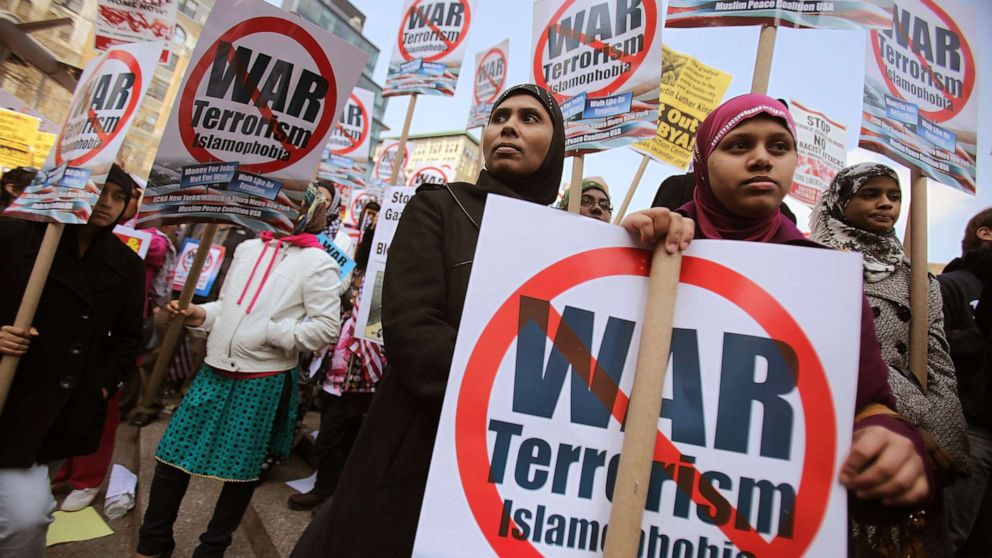20 years after 9/11, Islamophobia continues to haunt Muslims
Sept. 11, 2001, marked the start of a new era for Muslims in the United States.
Shortly after al-Qaida terrorists attacked the Twin Towers and the Pentagon, many Muslims, as well as other Arab Americans, became the targets of anger and racism.
Mosques were burned or destroyed and death threats and harassment followed many Muslims in the weeks following the attacks, according to congressional testimony from the Southern Poverty Law Center in 2011. Some victims were beaten, attacked or held at gunpoint for merely being perceived as Muslim, the organization said.
Rep. Ilhan Omar, D-Minn., who is Muslim, reflected on 9/11 and the discrimination that followed in an interview with ABC News. "As Americans, as people who are living here, we were also attacked," she said. "This is our community, this is our country, and there were Muslims who lost their lives in those towers, who were Muslim firefighters, who lost their lives."
She added, "There is a desire by many to use our faith and our identity as a weapon against us and to 'other' us. That has been really harmful in so many ways."
Hate crimes against Muslims rose 1617% from 2000 to 2001, according to the FBI marking some of the highest numbers of Islamophobic hate crimes ever in the U.S.
But even as the country moved further from the attacks and the Muslim American population in the country grew, discrimination against this community has not waned, Pew Research Center reports.
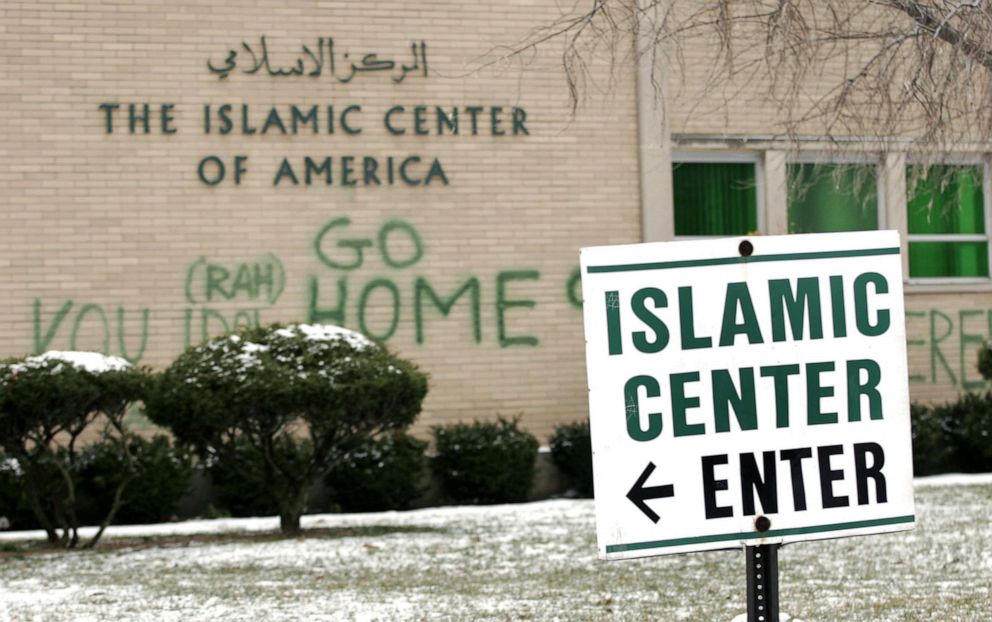
After the 9/11 attacks
On Sept. 17, 2001, then-President George W. Bush spoke at the Islamic Center of Washington, D.C., to denounce hatred against Muslims amid his vows to "win the war against terrorism" in the Middle East.
"The face of terror is not the true faith of Islam," Bush said. "That's not what Islam is all about. Islam is peace. These terrorists don't represent peace. They represent evil and war."
And for the most part, the public agreed with the president -- the Pew Research Center found that 59% of people had favorable views of Muslim-Americans following the attacks, although 40% of the public believe that the terrorists were motivated at least in part by religion.
However, those who didn't view Muslims favorably went on the offense. Across the country, reports of bomb threats, arson and assaults against Muslims made headlines.
"In the post-9/11 period, there was a lot of fear about Muslims and terrorism in the United States and so we created all these new opportunities to surveil citizens and harass citizens and even entrap citizens in our desire to fight terrorism," said Sally Howell, director of the Center for Arab American Studies at the University of Michigan-Dearborn.
As years passed, the number of hate crimes dropped (and then rose again in recent years), according to the FBI, but the damage was done. For years, Muslims in the United States felt unsure about their place in American society, according to the research initiative by the University of California, Berkeley called Islamophobia Research and Documentation Project.
"This for me is one of the saddest pieces in the survey -- we asked people, as a Muslim living in the West, if 'I feel more strongly insecure and afraid for my family and kids,'" Hatem Bazian, a lecturer at the University of California, Berkeley and leader of the college's Islamophobia Research and Documentation Project.
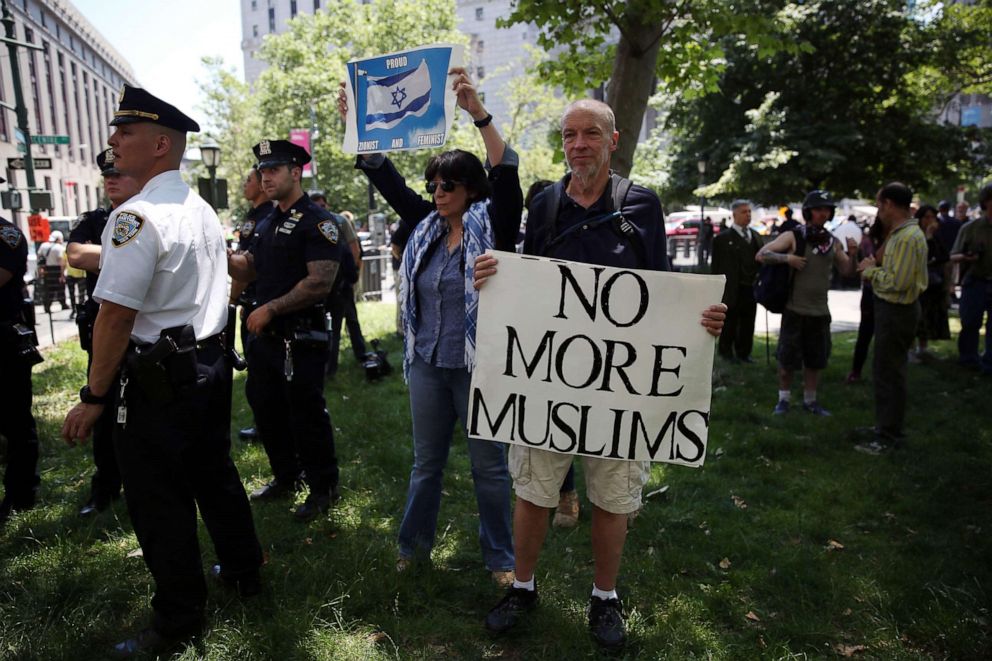
He said that of the people surveyed, almost 80% said they feel at least somewhat worried about the safety of their family in the U.S.
And each election cycle, that uncertainty about their role in American society was exacerbated. Islamophobia became a political tool, with some public figures, like former President Donald Trump and media commentators using the fear against Muslims and Arab Americans to rile up their bases.
Islamophobia as a political tool
Anti-Muslim rhetoric was used against former President Barack Obama during both of his presidential campaigns, despite the fact that Obama is a Christian. Racist and xenophobic rumors about his religion and about his birthplace were used to stoke outrage and mistrust against Obama, weaponizing pre-existing fear about Muslims.
Opponents doubled down on conspiracy theories about Obama concerning his nationality and religion -- falsely claiming that he was ineligible to become the president because he was not born in the U.S., or that he secretly practiced Islam, which would not make him ineligible for the presidency.
"Islamophobia was monetized into votes at the ballot box by projecting Obama as a closet Muslim," Bazian said.
Anti-Muslim sentiment continued during the 2016 election cycle, during which Islamophobic hate crimes surged again.
According to the FBI, there were 481 incidents in 2001, followed by a significant decline in incidents the next year -- 155.
In 2015, there were 257 hate crimes against Muslims and 307 in 2016. The number of incidents has declined since then through 2019, the latest year for which data is available.
Experts link the rise in hate to the anti-Muslim rhetoric being espoused on the political stage. then-candidate Trump made the Islamic faith and Muslims targets of criticism throughout his presidential campaign including proposing a ban on Muslims entering the country.
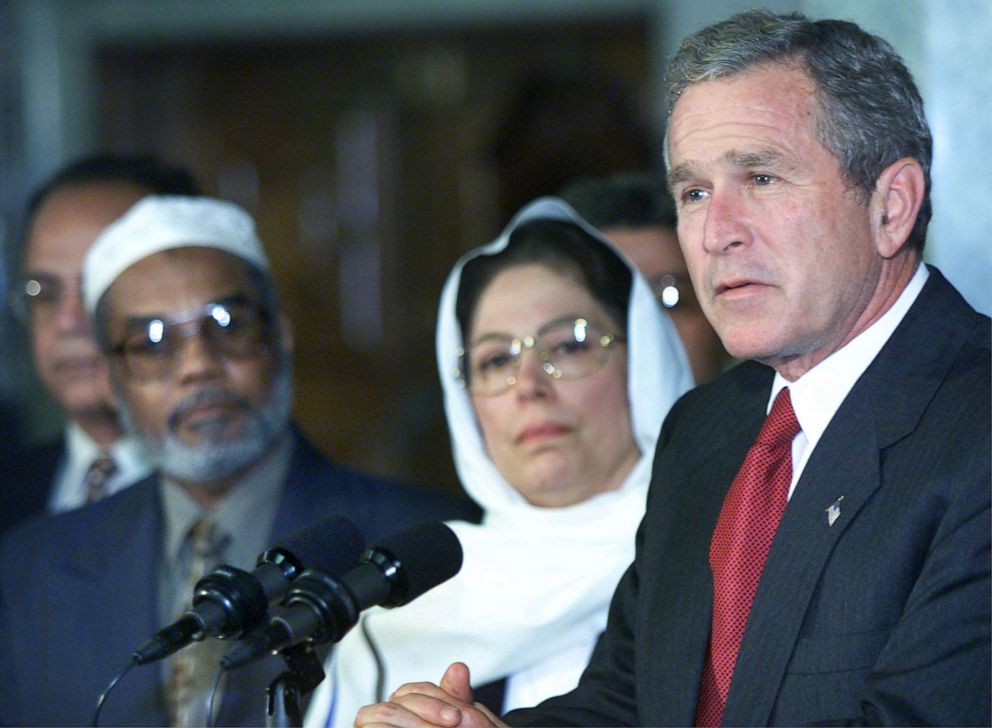
In November 2015, he made unsubstantiated claims on ABC News that Arab Americans were celebrating the fall of the Twin Towers: "There were people over in New Jersey that were watching it, a heavy Arab population, that were cheering as the buildings came down. Not good."
In March 2016, Trump claimed on CNN that hatred defined the Islam faith, saying "I think Islam hates us. There's something there that — there's a tremendous hatred there. There's a tremendous hatred. We have to get to the bottom of it. There's an unbelievable hatred of us."
During the first months of the Trump administration, the Pew Research Center reported that roughly 75% of Muslim American adults said there is a lot of discrimination against Muslims in the U.S.
Shortly into his time in office, Trump signed an executive order that barred immigrants from several Muslim-majority countries in a move that critics say enshrined his anti-Muslim stance into law. While he was a presidential candidate, he called for a complete ban on Muslims entering the United States.
The measure was legally challenged until the Supreme Court upheld an amended version of the order in 2018. It affected travelers and immigrants from Muslim-majority countries like Iran, Somalia, Yemen, Syria, and Libya.
It also included North Koreans and some Venezuelans, and other nations were added to the list in 2020.
From 2017 to 2021, when Biden ended the ban, more than 40,000 people were refused visas because of the executive order, according to U.S. State Department figures.
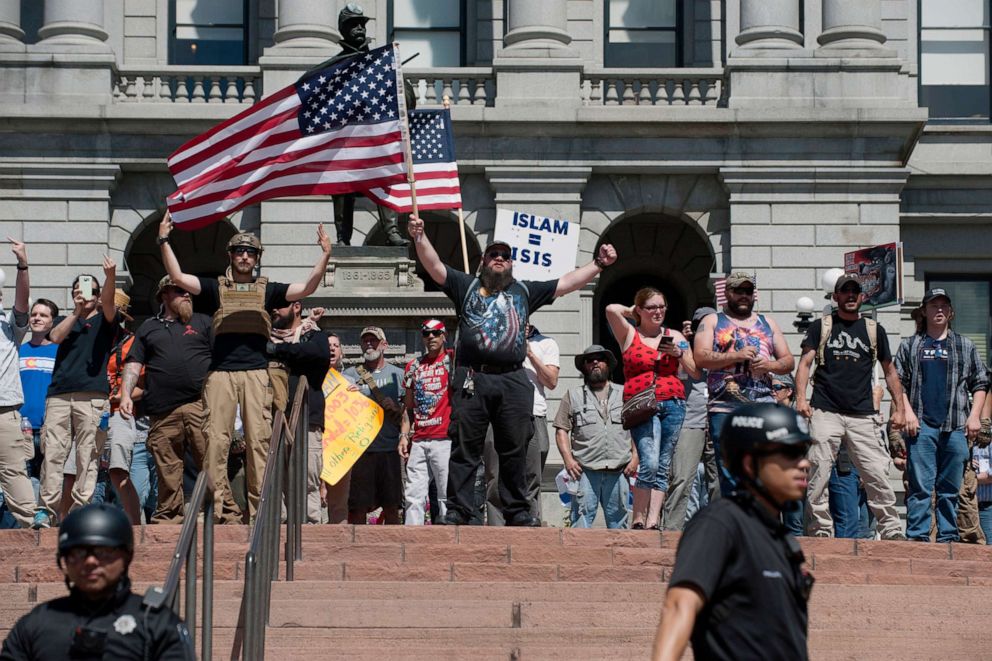
Trump and supporters of the order denied that it was Islamophobic, saying instead that it was protecting the U.S. from terrorism. But advocates say that the order, which is no longer in effect legitimized hatred and fear of Muslims, making life and immigration to the U.S. much harder.
"It takes a long time to undo the effects of these types of messages and these types of campaigns," Bazian said. "Islamophobia is not really about Muslims. It uses Muslims, but it's not about Muslims. It's about the rallying the discomfort of certain pockets of Western society at a time of unsureness."
Now, Muslim communities across the country are focused on building safe communities and curbing Islamophobia with education and outreach following years of anti-Muslim rhetoric in the White House.
Building community and combatting discrimination
Despite efforts by some groups to quell this population, Muslims have continued to grow and thrive in the U.S.
Muslims have slowly gained representation in the government, in U.S. television and a presence in the public sphere across the country.
"If you look at the Detroit area and the contributions that immigrants from the Muslim world are making to society and the economy -- they're just the bedrock and backbone of so many local industries," Howell said.
In 2007, the first Muslim member of Congress, Rep. Keith Ellison, D-Minn., was elected. In 2018, voters elected the first Muslim women to hold a seat in Congress: Democratic Reps. Omar and Rashida Tlaib.
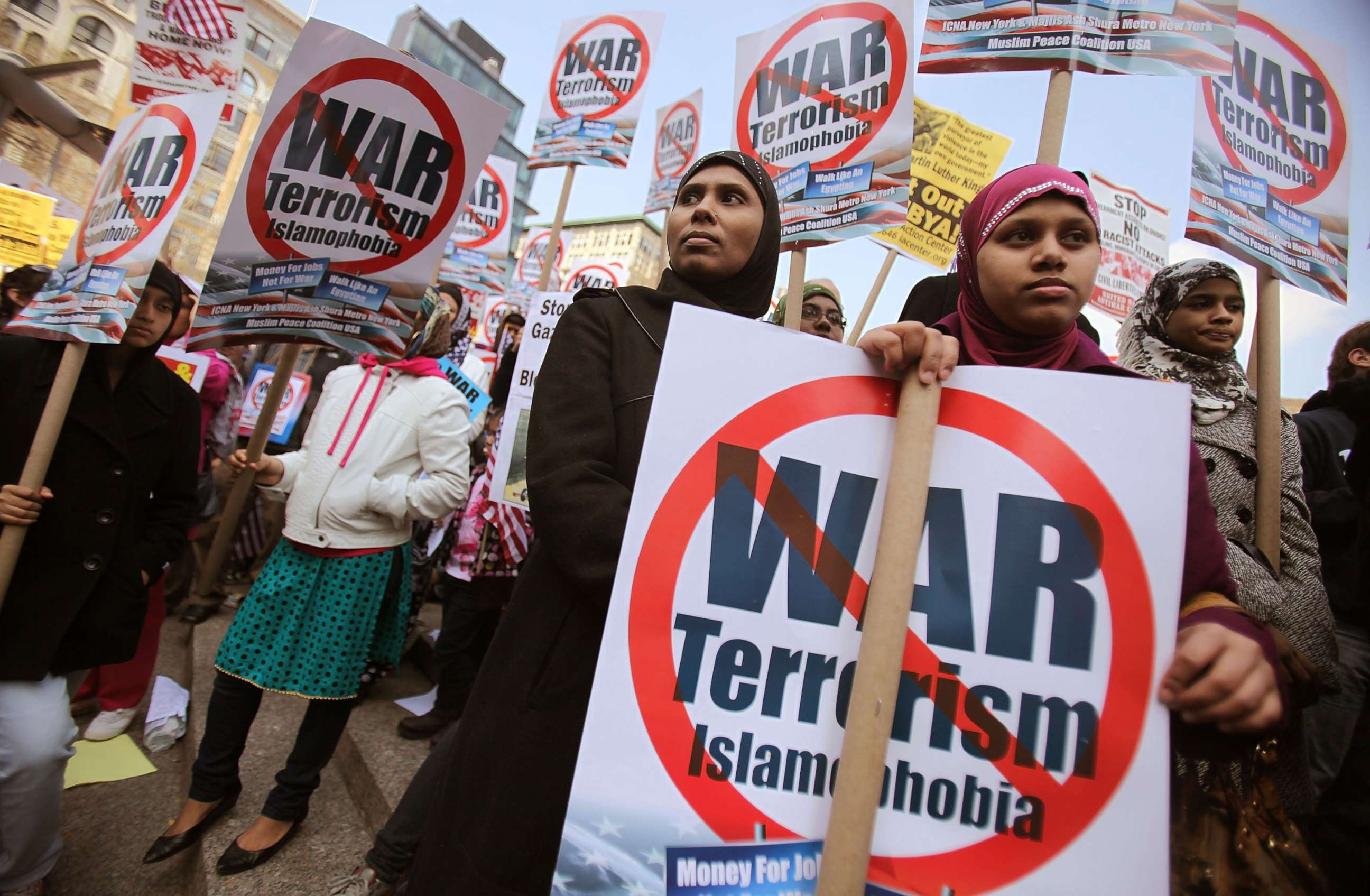
In an interview, Tlaib told ABC News that her Muslim faith and background helps her understand the harm that can come from Islamophobia and xenophobia.
"We can be there to talk about it and say, 'no, it didn't work 20 years ago, it's not going to work now. And you're actually making us less safe in your and you're also enabling hate and racism in our country when you target people solely based on their faith,'" Tlaib said. "I think that's why were so strongly in opposition of the ban on people of Muslim faith into our country and so much more."
The Muslim population in the U.S. continues to rise and is projected to have grown to 3.85 million people in 2020, according to the Pew Research Center. And as more Muslims continue to cultivate communities across the country, more houses of worship in the U.S. have appeared over the last 20 years as well.
The Cooperative Congregational Studies Partnership found 1,209 mosques in the U.S. in 2000 -- and that number more than doubled in 2020, when researchers found at least 2,769 mosques.
Islam has been seen in the Western world in a negative light, according to Bazian, who believes this negative portrayal couldn't be further from the truth. He says education is the first step to ridding the faith and its people of this stigma.
"They created this fear that America is being taken over by Muslims," Bazian said, recommending training to teachers, human resources and the workplace. "We have been playing ignorant for some time, so education is still one of the primary tools to counter Islamophobia."
Most Americans don't know a Muslim, or admit to not knowing anything about Muslims, according to a Pew Research Center survey.
"The public has fairly limited sort of direct knowledge or interaction with Muslims," said Dr. Besheer Mohamed, a senior researcher at Pew Research Center. "People who say they personally know someone who's Muslim, then they have more positive views toward Islam and toward Muslims than people who don't."
This invisibility, Howell said, is what is giving Islamophobia its power.
"It's important that we understand that because we need to know that Muslims are not outsiders, they're not strangers," Howell said. "When Muslims are visible to non-Muslims through their institutions, through their names, through their headscarves, through the Halal signs on their restaurants, then people would know their co-workers, their neighbors, as Muslims, and this helps overcome whatever you know prejudice or concern they might have."
